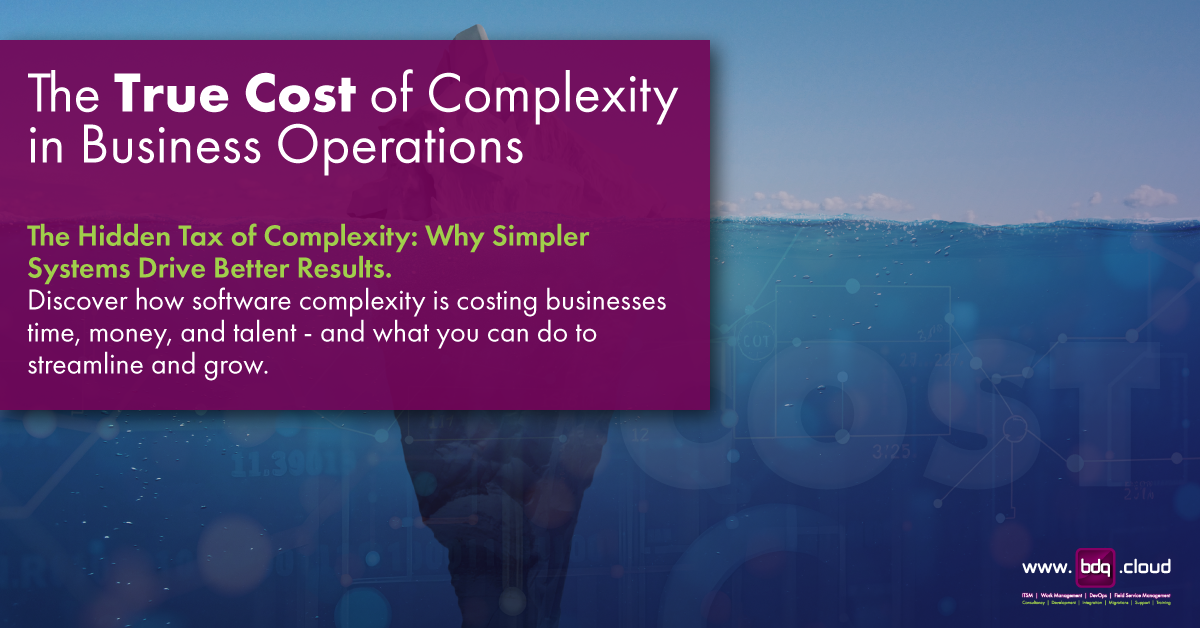The Hidden Tax of Complexity: Why Simpler Systems Drive Better Results
Imagine gaining back an entire workday - every week. According to Freshworks’ Global Cost of Complexity report, that’s exactly what your team could reclaim by removing digital friction. The report reveals that employees lose an average of 6.8 hours per week - nearly 350 hours a year per person - just trying to navigate convoluted software systems and inefficient processes.
This isn’t just a productivity problem; it’s a financial and strategic one. Complexity has become a silent drag on growth, morale, and customer satisfaction.
Complexity Isn’t Sophistication - It’s a Barrier to Growth
For too long, businesses have equated complex systems with maturity and capability. But as the report shows, this mindset has backfired. When tech stacks resemble “Medusa” - with many heads that “bite back” - they introduce friction instead of flow.
Key stat: Complexity leads to a 7% annual revenue loss on average.
It’s not just about wasted time. Complexity saps momentum from strategic initiatives, product innovation, and customer engagement. Companies are literally paying for software they don’t use:
The Human Cost: Burnout and Attrition
Perhaps the most alarming revelation? 60% of employees say they’re at least somewhat likely to quit within the next year - and the top reasons include complexity, unclear processes, and burnout.
Let’s look at what’s driving this sentiment:
-
On average, employees use 15 software tools and 4 communication channels daily.
-
45% of workers say their teams are disconnected, and 38% report unclear process communication.
-
32% cite disconnected or duplicative tools as a major issue.
The result is not just inefficiency - it’s disengagement. And disengaged employees cost companies in more ways than one. According to Gallup, highly engaged teams are 23% more profitable than their disengaged counterparts.
By the Numbers: Complexity’s Impact
Here are the hard stats you can use in your next leadership meeting:

Complexity Erodes Customer Experience Too
It’s not just internal teams feeling the pressure. Customer support staff are also struggling with disconnected data and tools:
This contributes directly to customer churn. In fact, 40% of support leaders say fragmented data makes it harder to personalise customer experiences - a crucial driver of loyalty and retention.
Simplicity Isn’t a Luxury - It’s a Competitive Advantage
So what’s the alternative? Companies that uncomplicate their systems are seeing transformational results.
According to McKinsey:
Gallup’s research supports this: businesses with highly engaged employees see 23% greater profitability. Simplification isn’t just about cost savings - it’s a growth strategy.
What You Can Do Right Now
You don’t need to overhaul your entire tech stack overnight. Here are practical first steps to reduce complexity:
-
Audit your software tools. Identify which are underused or redundant.
-
Consolidate where possible. Fewer tools with deeper integrations reduce friction.
-
Empower employees with training. Clear workflows and communication increase productivity.
-
Choose systems that scale with you. Opt for intuitive platforms that deliver ROI quickly.
-
Work with the right partner. Don’t go it alone - implementation expertise can be the difference between success and “regret spend.”
Don’t Let Complexity Hold You Back
At BDQ, we help businesses remove complexity from their systems through tailored consultancy, implementation, and support services. Whether you're looking to streamline service management, simplify project collaboration, or improve reporting, we’re here to help.
If your business is experiencing any of the challenges in this post, get in touch. Let’s talk about how to uncomplicate your operations - and unlock real growth.
👉 or email enquiries@bdq.cloud
or email enquiries@bdq.cloud
Sources: Freshworks, Global Cost of Complexity Report (2025); McKinsey; Gallup





